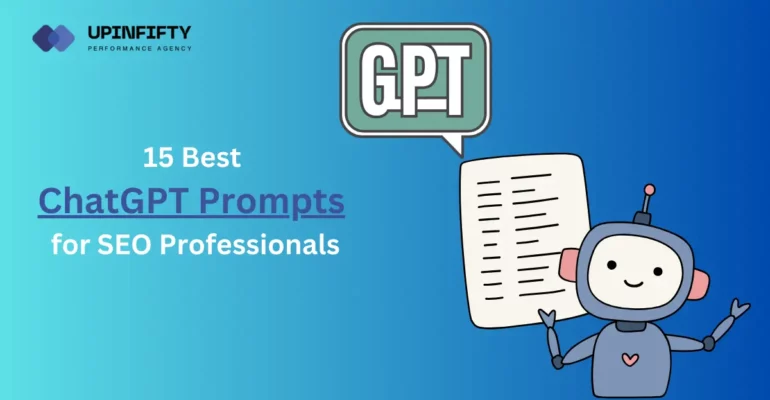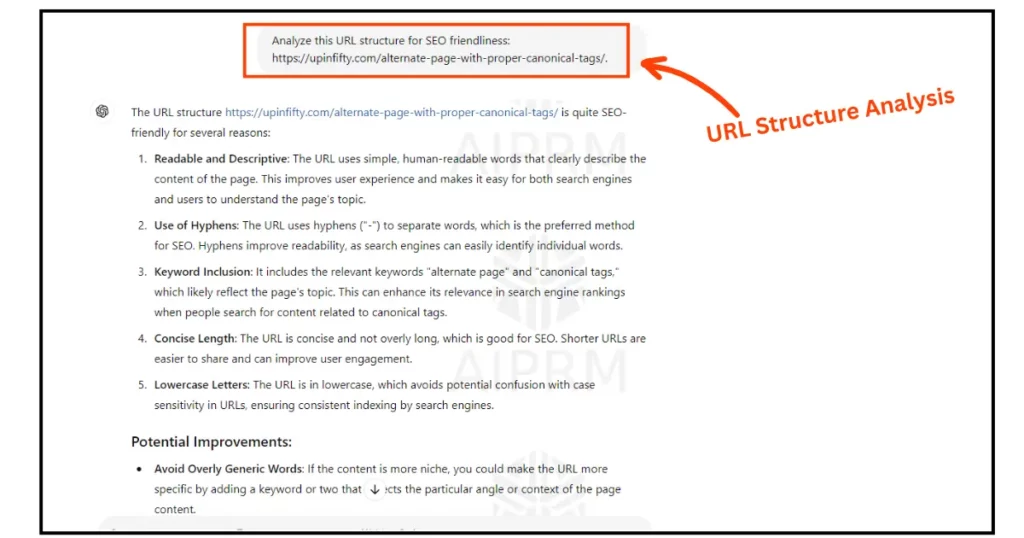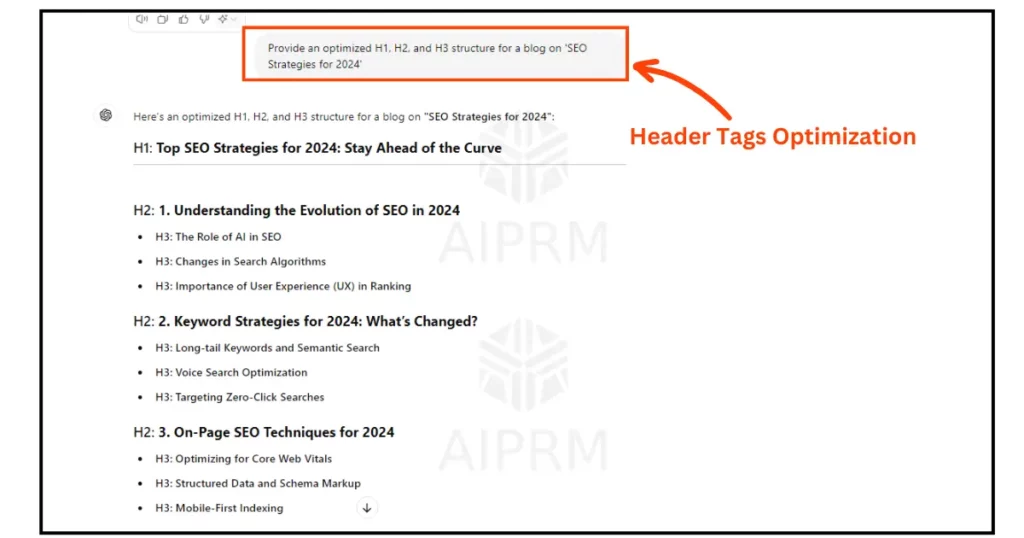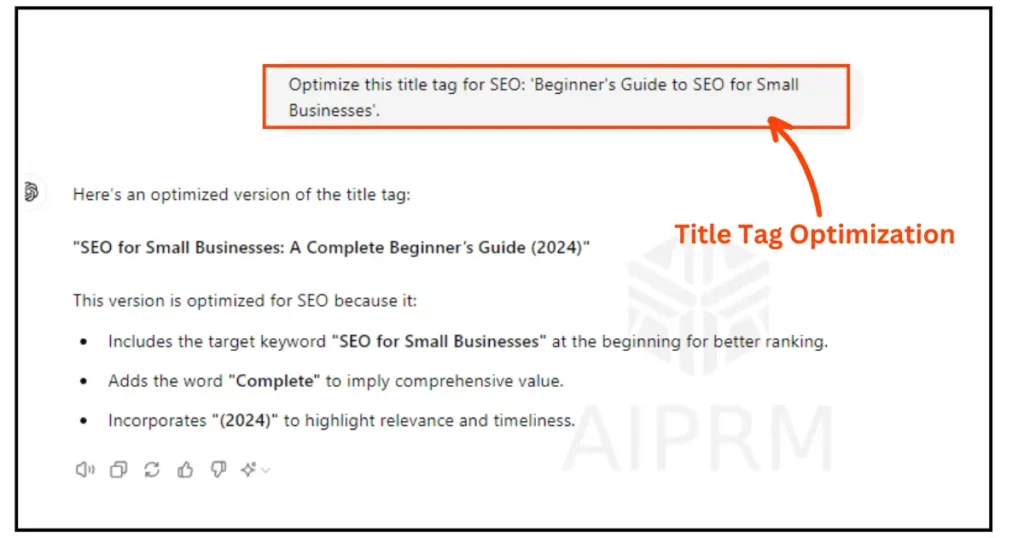15 Best ChatGPT Prompts for SEO Professionals| Upinfifty

15 Best ChatGPT Prompts for SEO Professionals| Upinfifty
Table of Contents
As of September 2024, ChatGPT has rapidly become an indispensable tool for SEO professionals, with over 200 million monthly active users and a notable surge in its applications across various fields. The exponential growth of AI in SEO and digital marketing is significantly driven by ChatGPT’s success, which saw over 100 million users within just two months of its launch. This advanced language model by OpenAI is reshaping SEO practices through its efficiency and creativity, transforming how SEO strategies are developed and executed.
In this blog, we’ll explore the 15 best ChatGPT Prompts for SEO Professionals, specifically designed to enhance their SEO efforts by drawing on the latest trends and capabilities of these powerful AI tools.
These prompts are categorized into key areas of SEO:
- Keyword Research
- Competitive Analysis
- On-Page SEO
- Content Optimization
- Technical SEO
- Content Creation
Also Read: Best ChatGPT Prompts for SEO Beginners
1) ChatGPT Prompts for Keyword Research
Keyword research is the foundation of any SEO campaign. It helps you identify the terms that potential customers are searching for and shapes your content strategy accordingly. ChatGPT can generate useful keyword suggestions, helping you find opportunities that your competitors may overlook.
a. Generate a List of Seed Keywords
Seed keywords are broad terms that you can expand upon to build your keyword strategy. They serve as the starting point for discovering more specific long-tail keywords.
Prompt:
“Suggest 10 seed keywords for a blog focused on digital marketing trends in 2024.”
When you provide ChatGPT with a topic or a niche, it can generate seed keywords that serve as the foundation for further research. For example, it might suggest broad terms like “SEO,” “content marketing,” “PPC,” “social media marketing,” and “influencer marketing” for a digital marketing blog. These keywords can then be expanded and refined based on your specific target audience and goals.
b. Identify Long-Tail Keywords

Long-tail keywords are more specific search phrases that tend to have lower search volume but higher conversion potential. These are essential for targeting niche audiences and improving your chances of ranking.
Prompt:
“Provide 10 long-tail keywords related to ‘content marketing for small businesses’.”
ChatGPT can suggest long-tail keywords such as “how to start content marketing for small businesses,” “best content marketing strategies for small businesses,” or “content marketing tools for small businesses.” These specific queries help you target audiences with clear search intent, increasing the likelihood of attracting highly relevant traffic to your site.
c. Keyword Clustering
Keyword clustering involves grouping related keywords to target multiple search queries with a single piece of content. It’s a great way to optimize your pages for multiple keywords, improving their chances of ranking.
Prompt:
“Cluster the following keywords: digital marketing, online marketing, social media advertising, SEO strategy, PPC campaigns.”
ChatGPT can help you organize these keywords into related clusters, such as “digital marketing and online marketing” or “SEO strategy and PPC campaigns.” These clusters can then guide the structure of your content, ensuring that you cover relevant topics while optimizing for a variety of search terms.
- example.com/page-1
- example.com/page-1?sort=asc
You may wish to instruct the search engine that one of these two pages is the primary or canonical version to prevent confusion on which page needs to be indexed in the search results page.
2) ChatGPT Prompts for Competitive Analysis
Competitive analysis is a critical component of SEO strategy. By understanding what your competitors are doing well, you can find opportunities to outperform them. ChatGPT can assist in identifying competitors’ strengths and weaknesses, helping you craft a strategy to gain an edge.
a. Duplicate Content Across Pages:
Content Gap Analysis
Content Gap Analysis identifies the topics and keywords that your competitors are targeting but you are not. By filling these gaps, you can create content that addresses your audience’s needs better than your competitors.
Prompt:
“Analyze the content gaps between my website focused on E-commerce SEO and top-ranking competitors like Website A and Website B.”
Using this prompt, ChatGPT will help you find the content gaps by comparing the keywords and topics your competitors are covering. If your competitors are writing about “mobile optimization for eCommerce” or “local SEO for online stores,” and you’re not, these gaps can represent missed opportunities for your site.
b. Competitor Keyword Identification
Identifying the keywords your competitors are ranking for can give you valuable insights into their SEO strategy. By targeting these keywords, you can potentially outrank them or find new opportunities.
Prompt:
“What are the top 10 keywords my competitors are ranking for in the digital marketing space?”
ChatGPT can analyze competitor content and suggest the keywords they are ranking for, such as “SEO services,” “content marketing tools,” or “paid advertising strategies.” Armed with this information, you can prioritize which keywords to target in your SEO efforts, giving you a clear direction on where to focus your content creation.
3) ChatGPT Prompts for On-Page SEO Professional
On-page SEO involves optimizing elements of your web pages to improve their rankings. This includes everything from URL structures to headers and meta descriptions. ChatGPT can assist in refining these components to ensure your pages are well-optimized for search engines.
To know more about On page SEO click here..….
a. URL Structure Analysis

A clear, concise, and keyword-rich URL structure helps search engines and users understand what a page is about. A well-structured URL can contribute to better rankings and improved user experience.
Prompt:
“Analyze this URL structure for SEO friendliness: example.com/category/2024-guide-digital-marketing-tips.“
ChatGPT can offer suggestions for shortening the URL, removing unnecessary words, and including the primary keyword. For instance, it may suggest modifying the URL to something like “example.com/digital-marketing-tips-2024” for better SEO performance.
b. Header Tags Optimization

Optimizing your header tags (H1 to H6) ensures that your content is structured in a logical and SEO-friendly way. It also helps both users and search engines navigate your content more effectively.
Prompt:
“Provide an optimized H1, H2, and H3 structure for a blog on ‘SEO Strategies for 2024’.“
ChatGPT can generate a well-organized header structure. For example:
- H1: “SEO Strategies for 2024: A Comprehensive Guide”
- H2: “Emerging Trends in SEO for 2024”
- H3: “How AI is Shaping SEO”
This structure improves readability, helps search engines understand the content, and ensures you cover relevant subtopics.
c. CTA Placement
Strategically placing calls-to-action (CTAs) on your pages can improve user engagement, conversions, and even SEO signals like bounce rate and dwell time.
Prompt:
“Where should CTAs be placed on a long-form blog post about digital marketing strategies?“
ChatGPT can suggest optimal CTA placements, such as after the introduction, midway through the post, and at the end. These are natural spots where readers are likely to take action, helping you increase conversions without being overly pushy.
4) ChatGPT Prompts for Content Optimization
Content optimization focuses on improving existing content to better align with search engines’ expectations. It includes refining title tags, meta descriptions, and incorporating related keywords. ChatGPT can assist by providing suggestions to improve various elements of your content.
a. Title Tag Optimization

Your title tag is one of the most important on-page SEO factors. It tells search engines what your page is about and influences click-through rates.
Prompt:
“Optimize this title tag for SEO: ‘Beginner’s Guide to SEO for Small Businesses’.”
ChatGPT can suggest optimized versions, such as “SEO for Small Businesses: A Complete Beginner’s Guide.” This version includes the target keyword and is structured in a way that could attract more clicks from search engine results.
b. Meta Description Creation
Meta descriptions don’t directly influence rankings, but they do affect click-through rates, which can impact your SEO success. A well-crafted meta description can entice users to click on your page.
Prompt:
“Write an SEO-optimized meta description for a blog post on ‘The Importance of Local SEO for Small Businesses’.”
ChatGPT may generate a meta description like: “Learn why local SEO is crucial for small businesses and how it can boost your visibility in local search results. Discover actionable strategies in this detailed guide.” This description is concise, compelling, and includes the target keyword.
Check out more about Meta Description
c. Implementing LSI Keywords
Latent Semantic Indexing (LSI) keywords are related terms that help search engines understand the context of your content. Including them in your content can improve its relevance.
Prompt:
“What LSI keywords can I use for the topic ‘eCommerce SEO strategies’?”
ChatGPT may suggest terms like “online store optimization,” “eCommerce product pages,” and “SEO for shopping websites.” These LSI keywords enhance your content’s depth and relevance, which can improve your chances of ranking for multiple related terms.
5) ChatGPT Prompts for Technical SEO Professional
Technical SEO ensures that your website meets the criteria that search engines need to crawl and index your site effectively. ChatGPT can assist in streamlining technical processes and ensuring that your site is optimized for search engine algorithms.
a. Create XML Sitemap
An XML sitemap helps search engines crawl your site by providing a roadmap to all your important pages.
Prompt:
“How can I create an XML sitemap for my website, and what should be included?”
ChatGPT will guide you on how to create an XML sitemap using various tools and plugins, ensuring all essential pages like blog posts, service pages, and product pages are included. A well-structured sitemap enhances your site’s crawlability and ensures no important page is overlooked.
b. Configure Robots.txt File
The Robots.txt file controls which parts of your site search engines can and cannot crawl. Misconfiguring it can lead to critical pages being excluded from search results.
Prompt:
“Help me configure a Robots.txt file for my eCommerce website.”
ChatGPT can provide a properly configured Robots.txt file template, ensuring that sensitive pages like admin pages are blocked, while important pages like product listings are accessible to search engines.
6) ChatGPT Prompts for Content Creation
Creating engaging, SEO-friendly content is a key element of any SEO strategy. ChatGPT can help you brainstorm ideas, structure your content, and generate outlines that keep your content focused and optimized.
a. Generate Blog Ideas
If you’re running out of ideas for blog topics, ChatGPT can help by generating a list of potential topics based on your niche.
Prompt:
“Suggest 10 blog post ideas for an SEO agency’s blog.”
ChatGPT can provide ideas like:
- “How to Perform an SEO Audit in 2024”
- “Top SEO Trends to Watch for This Year”
- “The Importance of Local SEO for Small Businesses”
These topics are designed to target high-value keywords while providing valuable content to your audience.
b. Create Content Outlines
A strong content outline ensures your blog post is structured, logical, and covers all relevant points. This helps keep readers engaged and improves your chances of ranking well.
Prompt:
“Create an outline for a blog post on ‘SEO for eCommerce Websites’.”
ChatGPT can provide an outline like:
- Introduction
- Why SEO is Important for eCommerce
- Keyword Research for eCommerce Sites
- On-Page SEO Best Practices
- Technical SEO for eCommerce
- Conclusion
This detailed outline keeps your content organized and ensures you cover all important aspects of the topic.
By leveraging these 15 powerful ChatGPT prompts, SEO professionals can streamline their workflows, enhance content optimization, and perform more effective keyword and competitor analysis. Whether you’re optimizing meta tags, creating compelling content, or improving technical SEO, ChatGPT can be an invaluable tool in your SEO arsenal.
As the SEO landscape continues to evolve, tools like ChatGPT will play an increasingly important role in helping professionals stay competitive, save time, and improve outcomes. Use these prompts to elevate your SEO game and stay ahead of the curve.
This detailed guide gives SEO professionals actionable ChatGPT prompts, making SEO work more efficient and strategic.!





